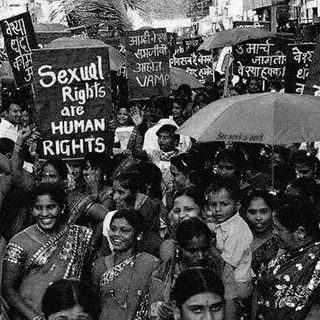
Let’s Start Treating Online Harassment As What It Really Is — A Crime
Calling it trolling minimizes the amount of damage it really does.

What happened to Rana Ayyub, a political and investigative journalist, earlier this year is the one of the most terrifying examples of online harassment turning sexual, and violent.
On 22 April 2018, Ayyub was alerted to a tweet, ‘quoting’ her as defending minor child rapists and talking about how Muslims weren’t safe in India, on what looked to be the Twitter handle of Republic TV, an openly right-wing television network. Both the quote, and the handle that posted it, were fake — but that didn’t stop it from spreading like wildfire.
In the days following the first tweet, Ayyub was stalked, abused, threatened and harassed relentlessly — including an open call encouraging people to gang rape her — on every social media channel where she had a presence. The next day, someone morphed her photograph into a two-minute, 20-second pornographic video. According to Ayyub, these online abusers have a formula they will always stick to. “If you have to discredit a man, call him corrupt. In case of a woman, assassinate her character,” she says.
Within minutes of its release, Ayyub’s social media notifications were blowing up with people gleefully sharing screenshots from the video. She was called a prostitute, and a fake Twitter account was created in her name for the sole purpose of doxxing, that is, the public sharing of address and phone number without consent. No matter how hard she tried to block the abusers, they kept multiplying, making it impossible to stop them. Many sent her naked photographs of themselves. Once these photos were available online, WhatsApp, with its end-to-end encryption, became the perfect vehicle for sharing them privately, given that the origin could not be traced.
Ayyub is no stranger to online trolling and abuse, as the author of the controversial book Gujarat Files: Anatomy Of A Coverup, where she asserts Prime Minister Narendra Modi and BJP President Amit Shah’s complicity in the 2002 Gujarat riots. But while her case might be an extreme one, with UN experts concerned for her life, it is by no means an isolated example.
Sreemoyee Piu Kundu, the author of Status Single, had her scariest brush with online sexual abuse after writing a Facebook post about her opinion on Salman Khan getting bail in a hit-and-run case. Instantly, 5,000 people reported her account as fake, and she was locked out of her own profile. “When I finally regained access, there were daily death and rape threats,” says Kundu. “Every time I express an opinion that misogynists don’t like, their first line of attack is always sexual violence. They will always want to attack your modesty and your sexuality. I am constantly told by these trolls that I’m single and frustrated. My inbox is filled with dick pics. The haters comment on my photos with my mother, calling us ‘randis’ (prostitutes). I’ve had my profiles cloned multiple times. There is no way to stop them.”
*
Women on the Internet, especially those who have achieved some degree of popularity or celebrity status, are routinely harassed for having an opinion and being vocal about it publicly. More often than not, the online attacks are of a sexual nature, using doctored photographs, uncharitable memes, or the standard fare of indiscriminate rape threats. But calling these serial abusers “trolls” minimizes the damage they do to the women they target.
A 2017 report by a cybersecurity solutions firm, Norton by Symantec, surveyed 1,035 Indian adults and showed that 41% of women had faced sexual harassment on the Internet. India ranked highest in the Asia Pacific region for online harassment through cyber-stalking and threats of physical violence.
According to an Amnesty International report on the impact of online abuse and harassment on women between the ages of 18 and 55, 23% of women said they had experienced online abuse or harassment at least once; 41% said the experience made them feel threatened about their safety, while 24% worried for their family’s safety. 76% said the experience of abuse had made them alter their social media behavior, while 32% said that they had completely stopped expressing their opinions on certain issues. While the report did not cover India as a research territory, it is not a stretch to imagine that they mirror these fears.
Journalist Swati Chaturvedi’s book, I Am A Troll, details how the BJP maintains and trains a large army of trolls to target politicians, journalists, activists, and even film stars. It quotes a former volunteer at the IT cell, Sadhavi Khosla, as saying, “We were given a hit list of people who needed to be constantly attacked.”
Read also: Women Are The Main Targets of Cybercrime. There’s a Solution for That.
“There are two types of abuse,” explains JNU student leader and Kashmiri human rights activist, Shehla Rashid, who has been the frequent target of online abuse. “One is organic, which stems from someone taking offence at something you said. They’ll immediately call you whore or ‘randi’. […] The other, more dangerous one, is the systematic, targeted abuse of anyone is critical of the government.” In one incident, Rashid had her photos taken and posted on the Internet without her knowledge or consent. “It was scary because the photo was taken from such close range that it made me wonder what if this person had a gun and was so close to me. This was right after Gauri Lankesh’s murder,” she says.
Every opinionated woman on the Internet learns to brush off sexually abusive language. Doxxing, however, is something they all dread, no matter what else they’re able to ignore. “When my address was put up on the Internet, I started receiving burnt copies of my book,” says Ayyub. “No matter how strong you are, the thought of them showing up at your doorstep and harming your loved ones will frighten you. I have police protection now. But I live with my family, and I’m always worried about their safety.”
*
The legal framework in India provides for several laws to protect people, especially women, from targeted online abuse, sexual and otherwise. Specifically, Sections 354A, 354D, 499, 503, 507, and 509 of the Indian Penal Code (IPC) all pertain to online sexual harassment. Under these laws, making sexually colored, obscene, and threatening comments, sharing pornographic content without consent, requesting sexual favors, online stalking, and violating a person’s privacy by publishing their photos without consent can be punished with imprisonment for two to five years, and a fine. In addition to all these laws, there has been a substantial push by the Union and state governments to increase cyber-crime sensitivity and dedicate units within police departments.
While in theory, these laws exist to protect women from exactly the kind of incidents that Ayyub, Kundu and Rashid describe, in reality, it is notoriously difficult to get justice using them. India’s first conviction for cyber-stalking was in 2009 — a full nine years after cyber-laws came into existence in 2000.
“For a lot of police officials, cybercrimes are new territory,” says Persis Sidhva, an advocate from Majlis Legal Centre. “Things have gotten better with training, but they still have a long way to go, both in terms of how many resources are allocated to cybercrime, and how tech-savvy they are.” The second problem is more sociocultural. “Most women will not report crimes against them, especially harassment of a sexual nature, because they feel that it will lead to their own freedoms being curtailed by their families. It’s easier to ignore, block, or just self-censor because in the larger scheme of things, cyber harassment doesn’t seem like an urgent enough problem.”
Both Ayyub and Kundu took the legal route, but without success. Most women don’t even try, given the sheer volume of abuse and the laborious process it is to get the needle to move even a little. Ayyub sums up the disillusion perfectly. “I couldn’t find who was behind the porn video, but I wanted to at least get the ones who were sharing it indiscriminately. I filed a police complaint, gave a statement, gave evidence, screenshots, everything they could have needed, but no one has been arrested yet. If they can treat a publicly known case like mine so callously, one can only imagine what happens when other women try to file cases,” says Ayyub.
In light of these situations, several calls have been made for Facebook and Twitter to take more accountability and introduce concrete plans to tackle the growing menace. In January this year, investment firm Arjuna Capital and the New York State Comptroller, Thomas DiNapoli, proposed shareholder resolutions asking that Facebook and Twitter study and produce reports about the scope of sexual harassment on their platforms, and whether the current measures to address the problem were working. While in recent times, both tech giants have had to address the issue of fake news, they’ve been largely silent about tech trauma that women are forced to endure globally. Outside of legal recourse, the only choices women have is to block or report their abusers, following which their accounts are either temporarily suspended or sometimes deleted.
And so, the online abuse of women continues, unchecked, ignored, and largely without consequence for anyone but its victims.
Sonali Kokra is a writer from Mumbai. She writes primarily on women's issues, relationships, culture, and lifestyle. In addition to writing, for the past 10 years, she has been attempting to make round chapattis at her mother's insistence. Currently, she is weirdly obsessed with smocks with pockets.
Related


Only 62% of Survey Respondents Expressed Hope that #MeToo India Will Prompt Change
